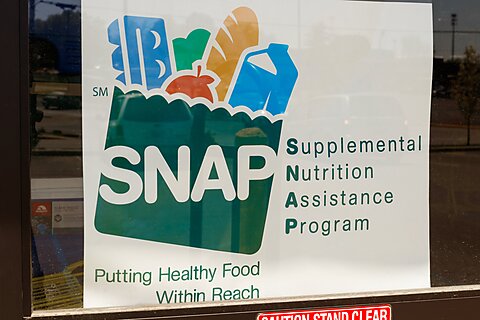Romina Boccia and Tyler Turman
The ongoing government shutdown—now the longest in US history—has brought renewed attention to Washington’s biggest non-healthcare welfare program: the Supplemental Nutrition Assistance Program (SNAP) or food stamps. With a shutdown deal in sight, legislators are planning to fund SNAP for the entirety of this fiscal year, while other parts of the federal government could face another shutdown standoff at the end of January. While the 42 million Americans on SNAP may soon see their benefits restored, policymakers should focus on reducing the program’s rising costs. Top of the list is the multi-billion-dollar liability embedded into SNAP’s budget by the Biden administration’s unilateral overhaul of the Thrifty Food Plan (TFP) in 2021. The Committee for a Responsible Federal Budget (CRFB) estimated that this reevaluation would cost at least $180 billion over the 2022–2031 period.
The USDA’s TFP update burdened taxpayers with a costly, permanent SNAP spending increase that Congress never approved. Republicans should eliminate billions in unnecessary annual spending by rescinding this unlawful, partisan entitlement expansion.
TFP’s Unprecedented Spending Surge
The Thrifty Food Plan is the USDA’s model for a minimal but nutritionally adequate diet for a typical family of four. Importantly, TFP is SNAP’s baseline for calculating the maximum amount of benefits a household can receive—higher TFP values mean elevated spending obligations. USDA periodically conducts comprehensive reevaluations of the TFP model to reflect changes in dietary recommendations, consumption patterns, and food composition. Historically, these reevaluations were all conducted on a “cost-neutral” basis. To be clear, cost-neutral does not mean that benefits remained flat year-over-year. USDA already performs annual cost-of-living adjustments (COLAs) to the TFP to ensure that SNAP benefits keep pace with inflation. These reevaluations updated the combinations of foods in the TFP model to reflect modern nutritional guidelines, but what remained “neutral” is that they did not increase the cost of the plan beyond adjusting for inflation.
In 2021, then-President Joe Biden’s USDA circumvented congressional spending authority by using a TFP reevaluation to trigger an unprecedented 21 percent benefit expansion. Per Foundation for Government Accountability (FGA) estimates, this reevaluation accounted for 95 percent of SNAP’s benefit cost hikes in 2021, and was a major factor in SNAP’s inflation-adjusted spending almost doubling from FY 2019 to FY 2022. SNAP’s current spending still has not returned to pre-COVID levels because, unlike Biden’s temporary pandemic measures, the price tag of the TFP reevaluation is permanently baked into the cake.
Driven largely by the 2021 TFP revision and increased food prices due to higher inflation expectations, the CBO now projects SNAP’s total costs from 2025 to 2031 to be $257 billion higher than it estimated in 2021 (Figure 1).
Biden’s TFP Broke the Rules
Proponents of the Biden administration’s 2021 TFP revision, like the Center for American Progress (CAP), have argued that the update was a long-overdue reform to reflect families’ nutritional needs and rising grocery costs. Prior TFP revisions usually happened roughly every 16–17 years (the last one being in 2006), and consumer food price increases due to inflation hit 40-year highs in 2021–2022—thanks in large part to excessive government spending during the pandemic. In theory, a new evaluation wasn’t entirely out of line. The problem, however, is how the reevaluation was carried out.
Congress authorizes the USDA to make comprehensive reevaluations of the TFP model, but every previous TFP reevaluation going back almost five decades was cost-neutral. USDA’s 2021 reevaluation under Biden broke this longstanding precedent that both Democratic and Republican administrations honored. Instead, it conducted the reevaluation without cost constraints, allowing TFP to balloon beyond inflation and increasing the plan’s costs by 21 percent.
The argument that an unprecedented benefit expansion was necessary to respond to rising grocery prices doesn’t hold water, either. Even with families facing steep food cost increases due to inflation, SNAP’s COLA updates already made SNAP benefits whole by adjusting the TFP to reflect relative food price increases every year. A cost-neutral TFP reevaluation would have done the same thing.
Moreover, TFP was already due for a reevaluation in 2022. However, Biden’s USDA cut corners to fast-track an update that would increase benefits just as temporary pandemic-era SNAP expansions were set to expire. In so doing, USDA bypassed basic rigor protocols to force a massive spending increase.
Proponents of the 2021 adjustment retroactively justified the move by arguing that it fulfilled a bipartisan mandate set by the 2018 Farm Bill, which did not explicitly impose a cost-neutrality requirement on USDA. The 2018 Farm Bill directed USDA to reevaluate TFP, but it made no provision granting USDA the authority to single-handedly increase SNAP spending through TFP reevaluations. Republican lawmakers at the time believed the cost-neutral principle still applied, and CBO made no mention of the reevaluation requirements adding to the deficit by 2028. The absence of explicit prohibition does not grant agencies carte blanche to abandon longstanding policy constraints.
The question wasn’t whether SNAP should respond to higher grocery costs or update periodically to reflect modern nutritional standards. It already does. It was whether the Biden administration had the authority to unilaterally lock in a permanent federal spending hike without congressional approval. The answer, as the Government Accountability Office (GAO) ruled, is a resounding no. This move clearly violated the Congressional Review Act of 1996 (which requires government agencies to submit significant policy updates to Congress).
Unwinding SNAP’s Spending Hike
The 2021 TFP overhaul cemented an unprecedented, unlawful expansion that continues to strain federal SNAP spending and put taxpayers on the hook for billions of dollars in higher costs every year. The One Big Beautiful Bill Act (OBBBA) was right to add constraints designed to prevent the USDA from unilaterally updating the TFP in a way that exceeds inflation rates in future reevaluations. However, it left billions of dollars in savings on the table by failing to rescind the $180 billion liability established by the 2021 TFP reevaluation itself.
Congress should take two decisive steps to undo this cost hike and uphold procedural safeguards for the next TFP update. First, it should repeal the 2021 TFP expansion and restore the pre-2021 formula to immediately slow SNAP’s cost growth and save billions of taxpayer dollars. Second, rather than redoing the 2021 TFP reevaluation, it should instead proceed with the next scheduled reevaluation in 2027, as mandated by the 2018 Farm Bill. However, it must ensure that USDA follows OBBBA’s cost-neutrality requirements to ensure that TFP composition reevaluations do not become back-door benefit expansions.
Programs like SNAP should ideally be devolved to the states so they can tailor or scale back their programs to reflect the needs of their local populations. However, many states may be ill-equipped to foot their share of the bills for a $100 billion program funded almost entirely by the federal government. As such, Congress should help foster a leaner, more affordable safety net for states to take over. It can start by repealing the TFP expansion and preventing future reevaluations from turning technical updates into Trojan horses for unauthorized spending increases.
















